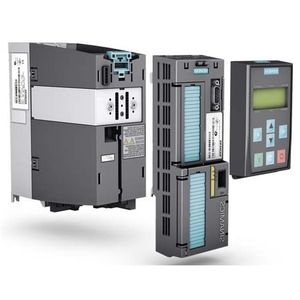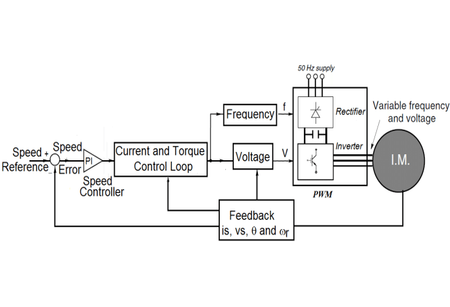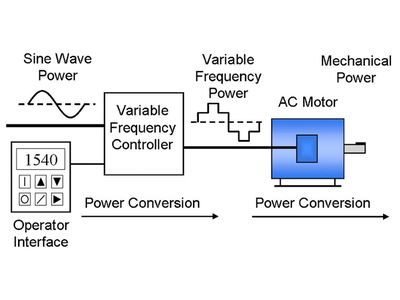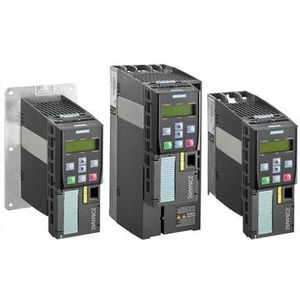What is the difference between vfd and vsd?
04.05.2021
Electric motors are used almost in every industry as they are high-efficient and convenient in use at the same time. Yet, there are lots of industries requiring a busload of energy. In that cases, owners of such energy-hungry factories require optimizing energy consumption and to provide that, several technological solutions are used. The most popular of them are variable speed drives and variable frequency drives.
Let's discover, what is the difference between a variable speed drive and a variable frequency drive?
Table of Content:
- What Types of Motors Require a Variable Speed Drive or a Variable Frequency Drive?
- What Is VSD?
- Key Benefits of VSD
- What Is VFD
- Key Benefits of VFD
- What's the Difference?
- Conclusion
What Types of Motors Require a Variable Speed Drive or a Variable Frequency Drive?
For up-to-date industrial goals, there are lots of electric motors types that are the most effective in the manufacturing process, agriculture and even vehicles.
If we'll consider the main footage of their application, it would be the following:
- Among various transporting vehicles they are powertrains, hybrid autos, some subsystem controls i.e. window lifters, windshields etc.
- If we consider the household level of electric motors use, they are installed almost in every type of home appliances and professional kitchen equipment, conditioning systems, elevators or HVACS.
- Industrial use of electric motors is even more widespread as these types are installed in every part of modern electrical or automated equipment.
To decrease the level of energy consumption of these motors, that is, for industrial goals, up to 40% of global energy production, special drives are used. One of them is VSD or Various Speed Drive.
What Is VSD?
Various speed drive has its explanation right in its name. It impacts electric motor's energy consumption via changing its speed. This kind of control works with the current's amperage and voltage. It changes them both in AC and DC electric asynchronous motors. If the motor is of an AC type, the variation is provided via a rectifier circuit that helps in turning AC to DC on a special voltage/amperage level. The building of DC various speed driver is much simpler yet it is no less effective. 
When choosing a control unit for DC motors, only all types of variable speed drives should be used. Speed controllers are included in the structure of many devices, as they provide accurate electrical control. This allows you to adjust the speed to the desired value.
The DC motor speed controller is used in many industrial and domestic applications.
Key Benefits of VSD
- Changes the speed, not frequencies.
- Allows controlling both AC and DC electric motors.
- Suitable for household appliances along with industrial motors.
- Is a perfect idea for starting and slowing down the motor.
What Is VFD
A variable frequency drive is a static converter device required to control the speed of rotation of induction electric motors. Asynchronous AC motors are significantly different from DC devices. The difference lies in the simplicity of design and ease of use. It is this factor that explains the popularity of induction motors.
It is important to note that speed control can be performed by devices such as a mechanical drive, hydraulic clutch, and others. But all these methods have significant drawbacks, which include the complexity of use, poor quality of work, high cost and small control range.
The types of variable frequency drives are the following:
- A three-phase VFD is connected to a three-phase 380V network and outputs three phases with a voltage of 380V at the output.
- A single-phase converter is connected to a single-phase 220V network and outputs three phases with a voltage of 220V at the output.
A various frequency drive for an electric motor will help to avoid multiple problems. i.e. during hard braking, the electric motor works like a generator and a braking resistor is needed to absorb the released energy. The resistance value of the braking resistor is indicated in the datasheet of the VFD. In this case, the speed control is performed by changing the supply voltage and the frequency of the electric motor. The efficiency of such a frequency converter reaches 98%, and the risk of occurrence and development of emergency situations is noticeably reduced. Be aware that this type of control drives suits only AC motors.
Key Benefits of VFD
- The motor accelerates and decelerates smoothly to prevent shock overloads and extend equipment life when it is controlled by a VFD drive.
- Compared to mechanical speed drives, frequency drives are cheaper and have a wider speed control range.
- Energy savings due to optimal load distribution depending on external factors.
What's the Difference?
When comparing VFD and VSD, the main difference is their working principle. While their goal is quite similar and it is reducing energy consumption and rising energy-efficiency of electric motor, various speed drive impacts the motor via changing its speed with the help of changed amperage or voltage. The working principle of various frequency drive, as it is obvious, lies in changing current signal frequencies. 
One more difference between VFD and VSD is their compatibility. When we talk about VSD, it is compatible with both AC and DC motors. VFD is used only for AC electric motors.
And the last difference is their designation. VSD drive is a good idea for motors that work with fast speed-ups and slow-downs required. VFDs are intended for the constant working process of the electrical motor.
Conclusion
When it comes to choosing a control drive for an asynchronous electrical motor, the choice is between two main types of control drives. For AC motor, you can choose both VFD or VSD depending on working routines and requirements. For DC motor, only VSD drive is appropriate.
In general, you are welcome to consult Eltra-Trade experts on what type of control drive for your motor to choose.
The choice depends on multiple factors, including:
- industrial/residential use of an electrical motor;
- its power features;
- the current type.
In Eltra-Trade, you are welcome to buy variable speed drives manufactured by world-known companies: Siemens, ABB, Schneider etc.
We'll provide you with a detailed consultation and offer fair prices for all industrial products.